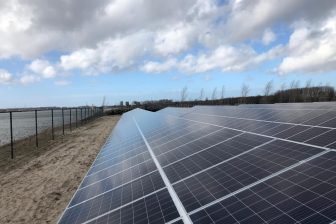Brexit en de mogelijke gevolgen voor energie en klimaat
12 juli 2016 – Dat de nieuwe Britse premier, Theresa May, eerst tegenstander was van een Brexit en nu belooft van het Brexit ‘een succes’ te maken is tekenend voor de onduidelijke situatie waarin het land nu verkeert. Is het al wel wat duidelijker wat een Brexit zal betekenen voor de wereld van energie en klimaat?
Op 23 juni stemde het Verenigd Koninkrijk in een referendum om uit de Europese Unie te stappen. Veel is nog niet duidelijk over de gevolgen, maar uit de afgelopen periode hebben we in ieder geval een aantal berichten over (mogelijke) effecten voor energie en klimaat op een rij gezet.
Shell: mogelijk vertraging in verkoop bezittingen
Het Britse vertrek uit de EU kan een vertraging betekenen voor Shells plannen om voor eind 2018 voor 30 miljard dollar aan bezittingen te hebben verkocht. Dat zou topman Ben van Beurden op een besloten bijeenkomst hebben gezegd. De Telegraaf: ‘Vooral in de Noordzee zou het door alle onrust rondom de brexit lastiger worden om snel bezittingen van de hand te doen. Shell wil met de verkoop van de bezittingen geld ophalen, onder meer om zijn grote schuld terug te brengen. Die is zo hoog geworden door Shells miljarden overname van het Britse gasbedrijf BG Group.’
Telegraaf, 8 juli 2016
Green Alliance: ‘Britain must embrace circular economy to trade with EU’
Green Alliance policy director and chair of the UK’s Circular Economy Taskforce Sue Armstrong-Brown: “If we want to trade with Europe – and it’s quite difficult to imagine a future where we wouldn’t want to trade with Europe – all of the EU product standards and design provisions would continue to apply for us. If we want to trade with the EU in a single market or outside of it, complying with the Circular Economy Package is the ‘no-regrets’ option as a nation and as businesses.”
Edie, 6 juli 2016
GoFossilFree: vrees dat beleggers weer naar fossiel gaan
GoFossilFree maakt zich zorgen over de dalende aandelenkoersen. Anielle Paffard van GoFossilFree: “Enerzijds zou dit kunnen betekenen dat investeerders minder open staan voor nieuwe stemmen zoals die van ons, waardoor ze zullen inzetten op investeringen die in het verleden rendabel bleken – zoals fossiele brandstoffen. Anderzijds kan het zijn dat investeerders onze boodschap begrepen hebben en weten dat er grote risico’s verbonden zijn aan investeren in fossiele brandstoffen. Mogelijk grijpen zij deze gelegenheid aan om die risico’s te vermijden en te desinvesteren.”
Paffard voorziet onzekere tijden van snelle, rigoureuze veranderingen en roept mensen op om zich juist nu in te zetten voor divestement.
De Wereld Morgen, 6 juli 2016
De Telegraaf: ‘Na Brexit olie geliefd’
‘Op de vlucht voor het Brexit-spook hebben veel beleggers in grondstoffen een veilige haven gevonden: De GSCI-index, graadmeter voor de grondstoffenhandel, troeft met 20% stijging dit jaar sinds februari de bredere MSCI-World Index ruim af.’ Brentolie +34%.
De Telegraaf, 5 juli 2016 (via Blendle)
Finanzen: ‘Beleggers stappen uit de oliemarkt’
Het Brexit zorgt voor onrust op de financiële markten en ontmoedigt speculanten om te investeren in risicovollere beleggingscategorieën als olie. Het afbouwen van posities door oliespeculanten zorgt voor de huidige daling van de olieprijzen, stelt Myra Saefong van MarketWatch.
Finanzen, 6 juli 2016
UN calls for post-Brexit UK to link with EU on environment policy
The Guardian: The UN’s new environment chief, Erik Solheim, has called for a post-Brexit Britain to link up with the EU on environment policy, adopting key bloc climate laws and maintaining its nature directives. He said: “The UK can relate to the EU’s climate decisions and be covered by them, just as Norway and Switzerland are. Norway brought its emissions into the Emissions Trading System (ETS) and adopted nearly all of the EU’s environmental law. You can coordinate closely with the EU even if you’re outside it.”
The Guardian, 6 juli 2016
ReedSmith: ‘No immediate impact on EU ETS’
Een bericht van ReedSmith, geciteerd door Breaking Energy: ‘The outcome of the Brexit referendum will have no immediate impact on UK compliance entities or non-compliance entities that are active in the EU ETS. Even once the notice to withdraw from the EU is delivered by the UK to the EU, a negotiation process will follow, dealing with the terms of the UK’s exit along with negotiations for the future of the UK’s relationship with the EU. (…) Once agreed and implemented, the exit may happen at a point that is
midway through a phase of the EU ETS. This could make the transition more challenging. With respect to its role as a signatory to the Paris Agreement, the UK may need to submit its own NDC as, at the time the country obligations kick in in 2021, it may not be part of the EU.
In the longer term, it is also possible to anticipate an indirect impact on EU ETS environmental policy going forward, triggered by the UK no longer being a leading advocate on the subject within the EU. (…)
The EU ETS is currently in the middle of its third phase, which expires on 31 December 2020. 1 January 2021 is, therefore, a natural break point in terms of the nature of any changes to the UK’s involvement in the EU ETS. (…)’
Breaking Energy, 5 juli 2016
Gazprom Nederland: ‘Brexit bedreigt de versterking van emissiehandel’
‘De EU verliest een lidstaat met een sterke oriëntatie op handel en marktwerking. Voor wat betreft energie raakt dat vooral het EU systeem van verhandelbare emissierechten. Dit zogenaamde ETS systeem is in potentie een krachtig instrument om de uitstoot van broeikasgassen in de EU terug te dringen. (…) Het aangekondigde vertrek dwingt waarschijnlijk zonder meer tot aanpassing van het ETS, aanpassingen waarbij de Britse focus op handel waarschijnlijk gemist zal worden. Zelfs al is het moment van vertrek nog ver weg, de marktprijzen reageren daar nu al op. (…)’
Gazprom Nederland, 5 juli 2016
Siemens bevriest investeringen in Britse windenergie
Het Brexit was voor Siemens reden om investeringen in nieuwe projecten in Groot-Brittannië stil te zetten tot er meer duidelijkheid is over de gevolgen.
Europa was tot nog toe volop betrokken bij de ontwikkeling van windenergieprojecten in Groot-Brittannië, onder meer via miljoenenleningen door de Europese Investeringsbank. Siemens roept de Britse regering op snel onderhandelingen te starten met de windenergiesector, nog voor Groot-Brittannië formeel uit de EU stapt.
Windenergie Nieuws, 5 juli 2016
How the UK can still lead on climate change – even after Brexit
The Conversation: ‘The architecture of the UK’s pioneering Climate Change Act of 2008 has so far proved robust to the shock of Brexit. Ensuring that it remains so, and continues to deliver meaningful decarbonisation, will be an enduring concern for many in post-Brexit Britain, and for supporters of ambitious climate policy around the world.’
The Conversation, 4 juli 2016
Hinkley Point C critics try to derail it amid Brexit vote turmoil
The Guardian: ‘(…) Britain’s flagship energy project, Hinkley Point C, is “hanging by a thread” as critics inside key funder EDF use the political turmoil from the Brexit vote to try to derail the already delayed £18bn scheme, the Guardian reports. Sources in Paris told the Guardian that the EDF board is in danger of fracturing further as former supporters of the project worry about Brexit. Detractors of the project say it is difficult to make a decision when it is “unclear who will be the future prime minister, chancellor of the exchequer and energy and climate change secretary”. (…)’
The Guardian, 1 juli 2016
EU climate ambition hit by Brexit
Energy Post: ‘(…) Officials in Brussels insist that climate and energy plans will continue as usual, but without the UK’s strong pro-climate input, the EU’s climate ambitions may well take a hit. (…) The European Commission will not postpone publication of its climate package on 20 July, officials say. This will include greenhouse gas emission reduction targets for all member states within the EU-wide “Paris” climate target of 27%. But how will this work if the EU’s second-largest emitter, the UK, can no longer be counted on to be part of the whole? No one really knows, but as one insider said: “Without the UK’s voice, the balance of opinion within the EU is likely to shift away from climate ambition.” (…)’
Energy Post, 1 juli 2016 (Registratie)



